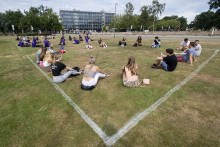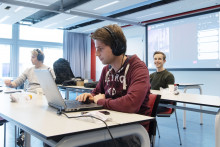To put it mildly, the corona crisis is putting first-year students to the test, says associate professor Maaike Endedijk (Department of Educational Science), who is leading the research. 'We think that it is difficult for first-year students to feel at home in their study programmes in this situation. Gaining knowledge during lectures is one thing, but they also need a peer group, for example to learn the unwritten rules. Many informal factors play a role in study success.'
Mirroring pre-crisis results
Endedijk carried out a similar research last year. 'In that project, Bridge the Gap, we already asked first-year technical students to what extent they feel at home in their studies. The results we gathered from this group of students can be compared to the current group. That way we know how much worse the situation is for the well-being of this group - or maybe not.'
Helpful interventions
The research will start in the course of October. At the end of this calendar year she expects to have the first results and a more in-depth analysis will follow early next year. 'It's important to note that we don't want to focus too much on the clinical results. Suppose, for example, that 30 percent of the participants turn out to be very stressed. That is not immediately helpful on an individual level. Experiencing stress is quite normal. But what helps someone to reduce that feeling?'
That is why the researcher wants to use a newly developed feedback tool. 'This way, we can give insights and support to participants. We can show them how they score compared to their peers. It may already be helpful to see that they are not the only ones that experience these feelings. We also provide tips from the field of positive psychology, to develop your own resilience.’
‘In addition, we refer to existing videos and web pages on well-being and to study advisors or student psychologists. To support educational programs, we provide insights in which contextual and personal factors play a role. In an earlier study, colleague Saskia Kelders observed that mental problems are more common among female, international and LGBT students. By working together in this research, we hope to provide insights into what type of intervention is most helpful for what type of student.'








